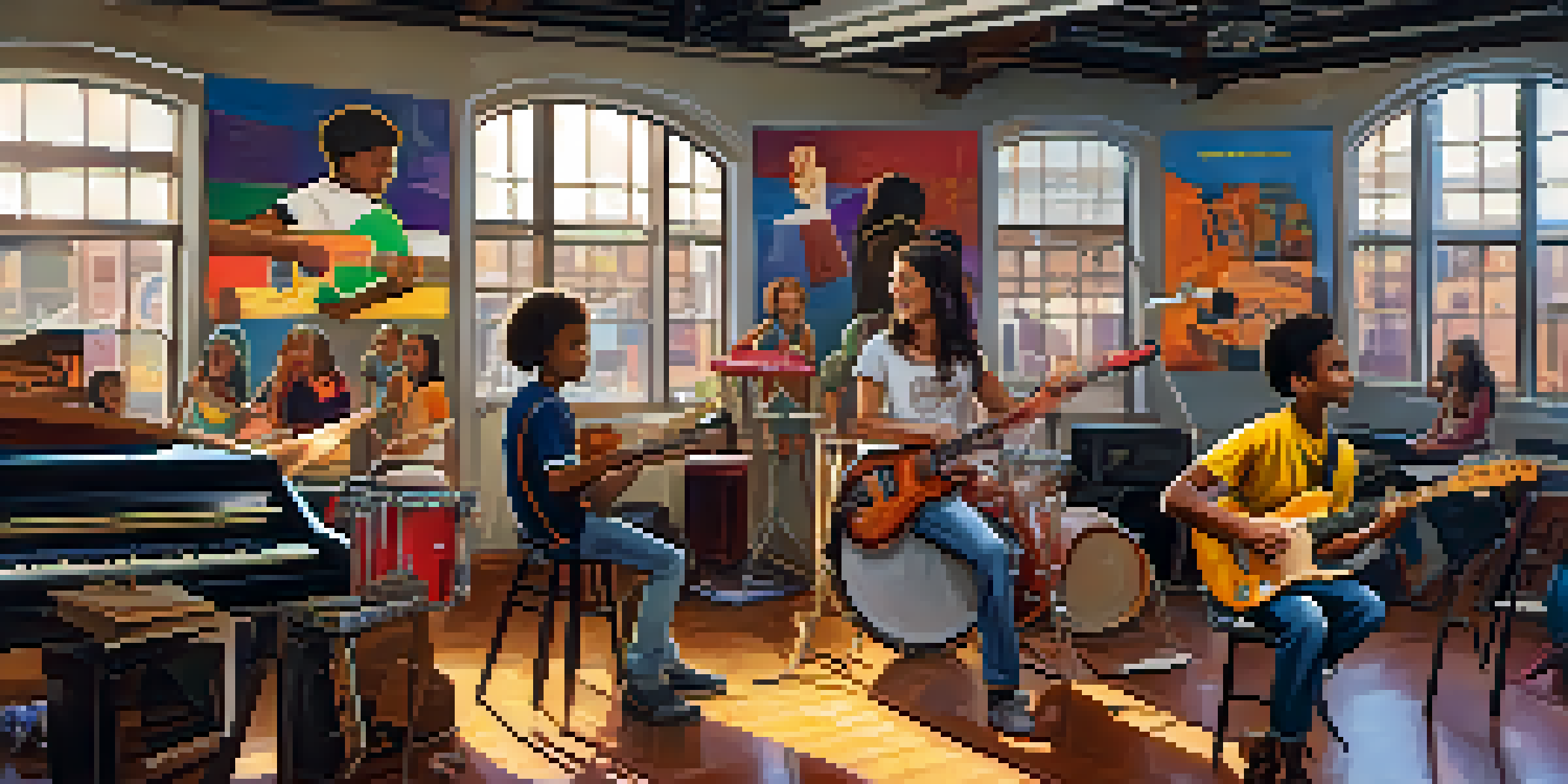Music Education's Impact on Urban Youth and Communities

Understanding Music Education in Urban Settings
Music education in urban areas often serves as a beacon of hope and creativity. In communities where resources may be limited, music programs can provide vital opportunities for self-expression and personal growth. These programs not only teach musical skills but also foster a sense of belonging and community among participants.
Music can change the world because it can change people.
In many urban settings, music education can take various forms, from school bands to local music workshops. These initiatives are crucial for engaging youth, helping them discover their talents and passions. For many students, these programs are not just extracurricular activities; they are lifelines that can steer them towards positive paths.
Moreover, music education can serve as a bridge, connecting diverse cultures within urban communities. It brings together individuals from different backgrounds, promoting understanding and collaboration through the universal language of music.
Enhancing Academic Performance Through Music
Research has shown that music education can significantly enhance academic performance among urban youth. Students engaged in music often exhibit improved math and reading skills, as musical training helps develop critical cognitive abilities. This correlation can be particularly impactful in communities where academic support is otherwise scarce.

For instance, schools that incorporate music into their curriculum often report higher test scores and graduation rates. The discipline required to learn an instrument or participate in a choir translates into better study habits and focus in other subjects. Thus, music education acts as a catalyst for overall academic success.
Music Education Boosts Academic Success
Engaging in music education enhances cognitive skills, leading to improved academic performance among urban youth.
Additionally, the skills learned through music—such as teamwork, discipline, and creativity—are invaluable in both academic and professional settings. By fostering these skills, music education prepares urban youth for a brighter future, beyond just the classroom.
Building Confidence and Self-Esteem Through Music
Participating in music education can significantly boost the confidence and self-esteem of urban youth. Performing in front of peers, whether in a band or a solo act, teaches students to overcome fears and embrace vulnerability. This practice helps them develop a strong sense of self-worth and personal identity.
Education is the most powerful weapon which you can use to change the world.
As students progress in their musical abilities, they often experience a sense of accomplishment that spills over into other areas of their lives. The feedback and encouragement they receive from instructors and peers foster a supportive environment that nurtures growth. This sense of achievement can be empowering, especially for those who may face challenges in other aspects of life.
Moreover, the friendships formed through music programs create a support network that enhances social skills and emotional resilience. These connections can be life-changing, providing a safe space for urban youth to express themselves and find their voice.
Fostering Community Engagement and Cohesion
Music education plays a vital role in fostering community engagement and cohesion in urban areas. Local concerts, recitals, and festivals bring together families and neighbors, creating a sense of unity and shared experience. These events not only showcase the talents of young musicians but also strengthen community bonds.
When communities invest in music education, they are essentially investing in their cultural fabric. Music becomes a shared language that transcends differences, bridging gaps between generations and cultures. This sense of belonging is crucial for urban youth, who often seek connection and purpose.
Music Fosters Community and Belonging
Local music programs create a sense of unity and cultural connection within urban communities.
Furthermore, community support for music programs can lead to increased funding and resources, ensuring sustainability and growth. As neighborhoods rally around their young musicians, they cultivate an environment rich in creativity and collaboration.
Addressing Socioeconomic Disparities Through Music
In urban areas, socioeconomic disparities can limit access to quality education and opportunities. Music education can help bridge this gap by providing resources that might otherwise be unavailable to low-income youth. Programs often offer free or subsidized lessons, instruments, and performance opportunities.
By making music accessible, communities empower youth to pursue their passions without the burden of financial strain. This inclusivity fosters diversity and ensures that talented individuals from all backgrounds can thrive. In essence, music education levels the playing field, enabling every child to dream big.
Moreover, when urban youth see successful musicians from similar backgrounds, it inspires them to envision their own potential. These role models can serve as powerful motivators, proving that success is attainable, regardless of one’s circumstances.
Cultivating Lifelong Skills Through Music Education
Music education equips urban youth with lifelong skills that extend beyond the classroom. Learning an instrument or participating in a choir develops discipline, teamwork, and perseverance. These skills are invaluable, as they prepare young people for various challenges in life and work.
Additionally, music fosters creativity and critical thinking, encouraging students to express themselves and approach problems from different angles. In a world that increasingly values innovation, these skills are essential for success in any field. Urban youth who engage in music education are better prepared to navigate their futures.
Technology Enhances Music Learning
Digital tools make music education more accessible and interactive, bridging gaps in traditional learning methods.
Ultimately, the benefits of music education ripple through a person's lifetime, influencing not only their personal growth but also their contributions to society. By investing in music education, communities are nurturing future leaders and change-makers.
The Role of Technology in Music Education
In today's digital age, technology plays a transformative role in music education, particularly in urban areas. Online platforms and apps make music learning more accessible and engaging for youth. This availability of resources can enhance traditional methods, allowing students to learn at their own pace and explore a variety of musical genres.
Moreover, technology enables collaboration among young musicians from different backgrounds and locations. Virtual ensembles and online classes create opportunities for diverse interactions, fostering creativity and innovation. This global connectivity enriches the learning experience and broadens students' musical horizons.

However, it's essential to ensure that all students have access to the necessary technology. Addressing this digital divide is crucial for maximizing the benefits of music education in urban communities, ensuring no child is left behind in their musical journey.